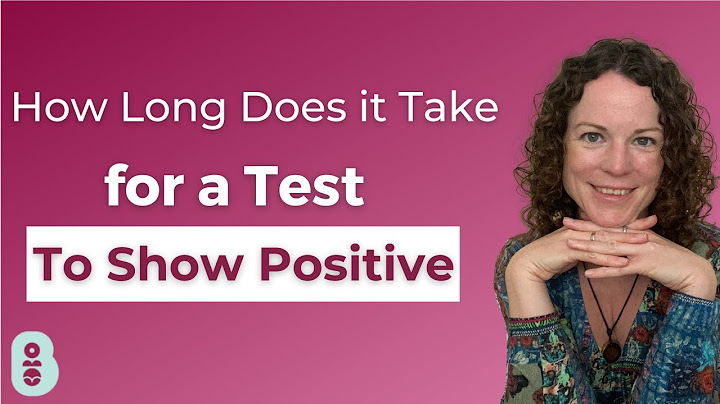After getting a negative result on a home pregnancy test, it's fair to conclude that you're not pregnant. However, if you happen to glance back at the test later in the day, you may be surprised to see that a positive line has magically appeared. There are a few reasons why this can happen. However, in most cases, the originally reading of the test, "not pregnant," is typically the correct one. Show
What Are Evaporation Lines on a Pregnancy Test?The instructions on most pregnancy tests will advise you to read the results within a certain window of time. This usually ranges between a couple of minutes up until 10 minutes later. If you see a positive result beyond this time frame, you may be left second-guessing the results. However, the false-positive reading, in this case, is due to something called an evaporation line. Evaporation lines are not indicative of a true positive result. Evaporation lines happen when the urine that was on the test area starts to dry. The chemical composition of the urine sample changes due to evaporation. As a result, the test may start to display a positive line. After the allotted time has passed, you should discard the pregnancy test to avoid confusion. If you follow all of the instructions correctly, you may notice a thin, faint test line that appears within a few minutes. It can seem at first that the line is too faint to count, but after 10 minutes, it darkens. There are several possible explanations for this line:
False Negative ResultsWhile true false negative results are rare, there are multiple reasons why you could get a negative or faint result even if you are actually pregnant, such as not waiting long enough into your cycle to test or testing with diluted urine. Always use a sample from your first-morning urine (which is more likely to have higher concentrations of the pregnancy hormone, hCG). If you are still unsure about pregnancy test results, wait a few days and test again. If you have any questions or concerns about whether or not you could be pregnant, consult with an OB/GYN. A Word From VerywellIt can very stressful to see conflicting results on a pregnancy test, such as faint lines or evaporation lines. If you're unsure about your results, retest in a couple of days or talk to your doctor about a follow-up blood test for confirmation. Following the directions on your pregnancy test helps avoid the confusion or disappointment of a false positive. Verywell Family uses only high-quality sources, including peer-reviewed studies, to support the facts within our articles. Read our editorial process to learn more about how we fact-check and keep our content accurate, reliable, and trustworthy.  By Robin Elise Weiss, PhD,
MPH Thanks for your feedback!
 An early pregnancy test can read positive as soon as 11-15 days after conception, 1 day after a missed period An early pregnancy test can read positive as soon as 11-15 days after conception, 1 day after a missed period. However, more accurate results can be obtained 2 days after a missed period. A home pregnancy test detects the presence of human chorionic gonadotropin (hCG), which is produced in a pregnant woman. Traces of hCG can be seen in urine 3-4 days after the fertilized egg implants in the uterus, and the amount doubles every 48 hours. When there is enough hCG in the body, a pregnancy test can detect it and produce a positive result. If your periods are irregular, however, and your test result is negative, you should repeat a home pregnancy test after 1 week. How accurate are home pregnancy tests?Home pregnancy tests are quite reliable and usually 99% accurate. However, it is critical to carefully follow the instructions on the package.
Here is how the tests work:
What can cause a false-positive pregnancy test result?In rare cases, a false-positive outcome can be caused by:
Other reasons for a false-positive result include:
 QUESTIONThe first sign of pregnancy is most often: See AnswerWhat tests are done to confirm pregnancy?In addition to false-positive results, a home pregnancy test may show a false-negative result, especially if you tested too early or if the kit was defective. In order to confirm the results of a home pregnancy test, talk to your doctor to undergo additional tests. Your doctor may order urine or blood tests:
If pregnancy is confirmed, an abdominal ultrasound can be done to assess the development and health of the fetus. When should you see a doctor?Regardless of your pregnancy test results, consult your doctor if you develop any of the following symptoms:
If your home pregnancy test result is positive, you should see your doctor to both confirm the pregnancy and begin prenatal care. Health NewsMedically Reviewed on 3/8/2022 References Image Source: iStock Images American Pregnancy Association. What is HCG? https://americanpregnancy.org/getting-pregnant/hcg-levels/ Betz D, Fane K. Human Chorionic Gonadotropin. [Updated 2021 Aug 11]. In: StatPearls [Internet]. Treasure Island (FL): StatPearls Publishing; 2022. https://www.ncbi.nlm.nih.gov/books/NBK532950 Memon N. How Soon Will a Pregnancy Test Read Positive? MedicineNet. https://www.medicinenet.com/how_soon_will_a_pregnancy_test_read_positive/article.htm Can a positive pregnancy test take awhile to show?Trace levels of hCG can be detected as early as eight days after ovulation. That means you could get positive results several days before you expect your period to start. However, the first part of your cycle is more variable than the second, making it tricky to determine the best time for an early test.
How many days does it take to come up positive on a pregnancy test?If you are pregnant, your body needs time to develop detectable levels of HCG. This typically takes seven to 12 days after successful implantation of an egg. You may receive an inaccurate result if the test is taken too early in your cycle.
Can a positive test show up later?After a positive test result, you may continue to test positive for some time after. You may continue to test positive on antigen tests for a few weeks after your initial positive. You may continue to test positive on NAATs for up to 90 days.
|

Related Posts
Advertising
LATEST NEWS
Advertising
Populer
Advertising
About

Copyright © 2024 muatrau Inc.


















